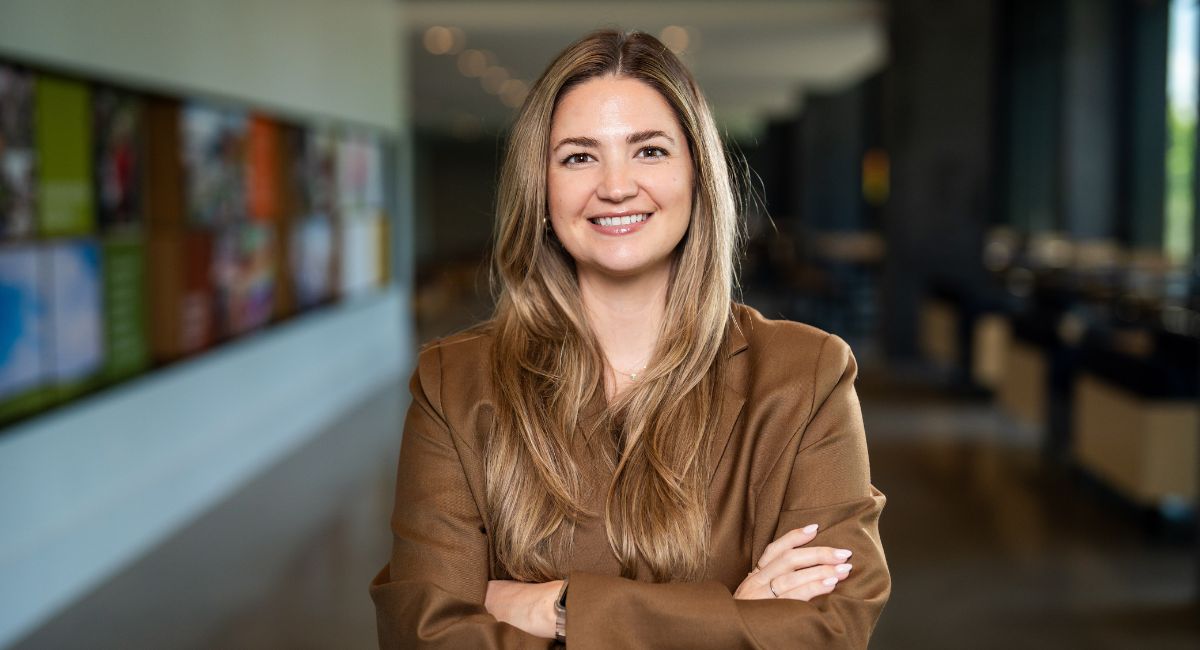
Taylor Rapson received the Gilbert S. Omenn Award for outstanding graduate students. Photo by Elizar Mercado.
When Taylor Rapson was working in a safety net clinic in Los Angeles’s Skid Row, she noticed that new technology systems in the practice were causing challenges for patients. Lab results, appointment scheduling, or contacting a doctor were being moved online, and while this made things easier for some patients, others were left behind. People who spoke languages other than English, who didn’t have reliable internet, or who didn’t have the comfort with technology that younger generations did, all struggled to use these tools and access important information about their health.
Rapson wanted to change this, not just for patients in the Los Angeles clinic, but for other safety net systems serving some of the most vulnerable communities in the U.S. That’s why she joined the University of Washington School of Public Health’s Health Services doctoral program, to research how to improve digital access for people already facing barriers to U.S. health systems.
“I seek to identify digital access barriers in general, but particularly among marginalized populations, so that we can address them and prevent further exclusions in care for populations who are already facing critical disparities,” Rapson said.
Rapson, a 2025 graduate, will defend her dissertation this summer. For her outstanding research, she was recently awarded the Gilbert S. Omenn Award for Academic Excellence, one of the most prestigious School-wide recognitions for master’s and doctoral students.
Rapson’s journey to doctoral research began with an important conversation. As she was earning a Master of Public Health in California, an emergency room physician visited class as a guest lecturer. The physician mentioned how difficult it was to heal people from conditions that were symptoms of their environment — like poverty or violence — and then send them right back into the environment that had caused their health emergency in the first place.
She remembers the physician telling the class, “If you want to change the way the health system works, then going clinical might not be the right path because it's much more difficult to do so seeing one patient at a time and working within the system than if you're outside of the system,” Rapson recalls. “That is what first made me realize I wanted to do research.”

Rapson also had firsthand experience with how important health care access was, and how difficult it could be to navigate. She was born with profound hearing loss and wears hearing aids in both ears. Doctors and family members were concerned about her ability to succeed in a hearing-dominant world and in school. She credits her parents with doing whatever it took to find the best audiologists and care.
“My background has led me to see the ways in which health is so important, and access is so important,” Rapson said. “But not everybody has equal opportunity and ability to get the health care that they need.”
Even amidst this access, Rapson also experienced how challenging it could be to get the support she needed. She relies on lip reading, but many situations, such as people masked at a doctor’s office, make this challenging.
“It can be really hard to advocate for yourself if you don't feel like you deserve it or if you’re worried it feels like you're being annoying or demanding,” Rapson said. “Through that, I saw how it must be so hard for people who don't understand their doctor, have trouble with transportation, or have chronic conditions to advocate for the things they need, or to even know what they should or can ask for. Not having that knowledge can make it difficult to receive the care that you need and deserve.”
At the UW School of Public Health, Rapson’s dissertation has focused on trying to help people receive this care. She studies the digital health apps and tools widely used by health care systems and the barriers patients have with using them. Rapson’s end goal is to reduce health inequities and improve health care for patients, especially those at safety net clinics.
Her research’s focus on safety net clinics is unique because they can be challenging to study. Funding for these facilities is limited due to their focus on serving uninsured and low-income populations, and staff don’t often have time or resources to participate in large studies. To conduct her research, Rapson was able to connect with researchers at the University of California, San Francisco, who work with a safety net health system the San Francisco Health Network, and had digital equity data that Rapson could analyze.
Using this data, she studied usability barriers to understand what skills are necessary for patients to navigate digital tools in a health care setting, a topic that had not been previously well-studied. She also looked at whether individualized training could help patients learn new health technologies. Finally, Rapson studied whether patients who were using the digital tools experienced health improvements, especially for patients who had diabetes.
Through this work, Rapson discovered that using digital tools demands more advanced skills than commonly assumed — requiring proficient text entry, device navigation, and the ability to follow complex, multi-step processes. Patients faced further challenges with intricate interface designs, which can pose significant barriers for people lacking foundational digital skills. She also found that tailored training is an effective strategy to improve digital engagement, particularly among certain subgroups of people, but that ongoing support rather than one-time training may be necessary.
Fixing these digital exclusions that patients are facing requires collaboration between health systems and digital health technology vendors, Rapson said. Vendors should adopt human-centered design principles to create interfaces that are intuitive, accessible, and responsive to users’ varying levels of digital proficiency. Health systems should also adopt strategies to provide ongoing technical support or digital education.
“Taylor came to our doctoral program dedicated to serving people seeking health care in safety-net health systems. Her dissertation research emphasizes that digital health technology tools like patient health portals are not one size fits all,” said Peggy Hannon, professor and interim director of the Health Services doctoral program. “Taylor’s research is identifying the barriers to using these digital health tools that many patients experience and testing strategies to make digital health tools more accessible to people who have limited access to or experience with these tools. Her interdisciplinary approach to addressing unmet needs exemplifies the mission of public health.”
While Rapson’s research focuses on improving health outcomes for low-income and uninsured populations, she emphasizes that this work benefits everyone, as improving the health outcomes for one group has cascading effects on the health of entire communities.
“Public health research is for the benefit of all people, even if the focus of research is on equity or marginalized groups,” Rapson said. “When we address inequities, it frees up resources in another way. It’s something that gets misinterpreted as drawing resources away from others just because it’s not overtly for everyone, when actually the opposite is true.”
Rapson’s research continues to be critical as digital technologies expand in health care settings to support providers and patients. After defending her dissertation this summer, Rapson plans to return to California and pursue a postdoctoral or independent research position to continue studying health care disparities and improve patient access.
“In the excitement around digital access, it’s easy to gloss over the fact it does create a lot of barriers to care for patients who are already facing disparities,” Rapson said. “It shouldn't be on the patients to have to advocate for themselves and fight for what we should be naturally trying to solve.”